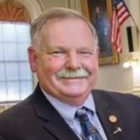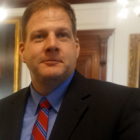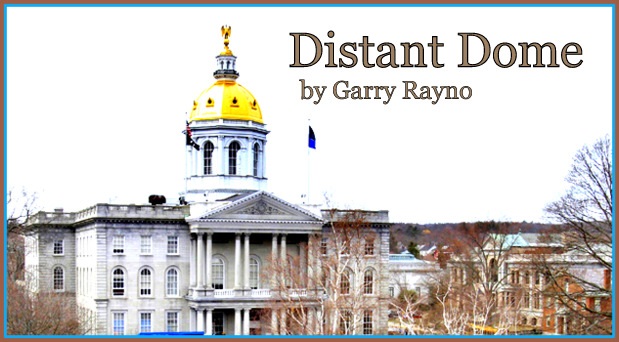By GARRY RAYNO,
Distant Dome
Holding open a proposed biennial operating budget as long as possible is always a good idea.
Unsettled issues like a new state employee contract or legal settlements on the state’s mental health system or Medicaid Enhancement Tax are often not decided until the last minute.

Garry Rayno
Holding the budget open means they can be included before the House and Senate take a final vote on the two-bill package that sets spending priorities for the next two fiscal years.
The proposed budget will remain open until the last minute this year as well, but not for the typical reasons.
The House and Senate usually negotiate a final version of the budget in a conference committee at the end of the session, but this year the House failed to approve a budget package in April.
In essence, the House should have no leverage in determining the next two-year spending cycle.
However, the $11.8 billion Senate approved package alludes to the House Finance Committee’s $11.9 billion proposal opposed by both Democrats and conservative Republicans.

Sen. Gary Daniels
Senate Finance Committee Chair Gary Daniels, R-Milford, said referencing the House Finance Committee plan was done as a courtesy to include it in final budget discussions.
That is not the only unusual occurrence with the two-year budget plan.
House Speaker Shawn Jasper, earlier this week when the House was not in session, used a recess rule allowing the speaker to non-concur with Senate changes to House bills and seek a conference committee and he did just that with the budget, although the House was in session Thursday to vote on what to do with other Senate-amended House bills.

Speaker Shawn Jasper
Jasper said the Senate agreed to the arrangement to avoid having the House amend multiple Senate bills with its budget position making the conference committee process a nightmare.
That’s fine, but why does anyone believe those budget amendments would have had any more support than the budget had back in April.
The shenanigans look like a way to avoid a House vote until pressure builds on lawmakers as they face a looming deadline of a new fiscal year without a budget.
If the House had taken a vote on the two-bill budget package Thursday — the operating budget and the trailer bill containing changes in policy needed to enact the spending plan — it could have approved the Senate’s budget proposal, killed it or asked for a conference committee.
Approval was unlikely as conservative Republicans believe it spends too much money, although it is $100 million less than what the House Finance Committee proposed, and Democrats believe it underfunds key social programs to fight opioid addiction, to develop the state’s workforce, to protect children and to adequately fund the mental health system, while once again slashing business taxes.
For those reasons, the Senate’s budget proposal was not likely to garner enough votes Thursday to do anything but fail, which would send the budget process back to the beginning.
It is possible enough Democrats may have wanted to at least have a conference committee on the budget but to do so they would have to buck their party’s hierarchy which hopes to see first-term GOP Gov. Chris Sununu’s first budget sink beneath a sea of partisan in-fighting, which would make it difficult to blame democrats for the failure.

Nancy West photo
Gov. Chris Sununu, R-NH
The House leadership has two weeks to work over enough Republicans to convince them to vote for a negotiated budget proposal.
The targets are the Libertarian-leaning conservative members of the House like those belonging to the New Hampshire House Freedom Caucus and the House Republican Alliance.
If Jasper wants to bring enough of these representatives on board to pass a budget, he did not do himself any favors when he announced the members of the House budget conference committee, which included the top GOP leadership and the ranking members of the House Finance Committee, but no members of the freedom caucus.
This all points to a protracted budget battle during the final days of the session and possibly a continuing resolution to fund state government if no agreement is reached.
That is what happened two years ago when there was a Democrat in the corner office and the House and Senate were controlled by Republicans.

Yogi Berra
Republicans have been waiting for 12 years to have one of their own in the governor’s office, but factions within the party are making it appear to be — in the words of the New York Yankee sage Yogi Berra — “deja vu all over again.”
The next two weeks will determine if the sage gets it right once again.
Health insurance rates
Major heath insurance rate increases on state exchanges under the Affordable Care Act have received lots of notice recently, although the rates required to be filed now are likely to be lower this summer.
The CEO of the second largest insurer on the New Hampshire exchange, Minuteman Health Chief Executive Officer Tom Policelli, told the Union Leader recently his company would seek a 30-percent rate increase next year.
He said two things are driving the rate increase, the high usage of Medicaid expansion customers accounting for a third of the increase and losses by another of the companies writing policies for the exchange accounting for the rest.
That company is Ambetter, which only insures Medicaid expansion clients and is one of two companies the state contracts to run its managed care program for traditional Medicaid clients.
The ACA did away with high risk pools, and instead requires those writing policies on the exchange to share the losses.
The increase will not be felt by those on Medicaid expansion because the federal government pays 95 percent of the cost and the state through insurers and hospitals accounts for the remaining 5 percent.
 Those who receive a subsidy through the exchange will feel little of the increase, but those who buy on the exchange and do not receive a subsidy will, according to Policelli.
Those who receive a subsidy through the exchange will feel little of the increase, but those who buy on the exchange and do not receive a subsidy will, according to Policelli.
New Hampshire’s Medicaid expansion program differs from most states because it sends those who qualify to the state exchange to purchase private policies with federal Medicaid dollars with a small state contribution.
When the state approved its Medicaid expansion program, Republicans insisted those newly eligible purchase private insurance policies rather than use traditional Medicaid through the state Health and Human Services Department.
The idea was to remove risk from state government and future appropriations, to help expand the market and to provide more money to hospitals that receive the private insurance reimbursement rate for services instead of the Medicaid rate, which is well below what it costs to provide the services.
At the time, few people expected the private insurance route to drive up premium costs.
However, that is not the only thing driving increases.
The federal government has been slow to enforce mandated coverage for everyone, which broadens the burden by including relatively healthy younger people in the base.
The uncertainty over what will happen in Washington is also driving up the cost, particularly the Trump administration’s threat to cut off federal money for subsidies, which will mean fewer people in the pool so rates are likely to increase in the future.

President Trump
President Donald Trump asked “who knew health care was this complicated?” several months ago as the House grappled with its repeal of the ACA.
Those lawmakers and stakeholders who spent their 2013 summer and fall trying to find an acceptable solution, and the bipartisan group of lawmakers who did find compromise that winter knew all too well how complicated the health care system can be.
The problem is the rate increases are talking points for the differing sides, but few want to take the time to explain why and how outside factors — some for purely political reasons — are influencing those figures.
Garry Rayno can be reached at garry.rayno@yahoo.com
Garry Rayno’s Distant Dome runs exclusively on Manchester Ink Link and InDepthNH.org, where Rayno will explore a broader perspective on State House – and state – happenings. Over his three-decade career Rayno has closely covered the NH State House for the New Hampshire Union Leader and Foster’s Daily Democrat, and his coverage spanned the news spectrum, from local planning, school and select boards, to national issues such as electric industry deregulation and Presidential primaries. He is former editor of The Hillsboro Messenger and Assistant Editor of The Argus-Champion. Rayno graduated from the University of New Hampshire with a BA in English Literature and lives with his wife Carolyn in New London.





